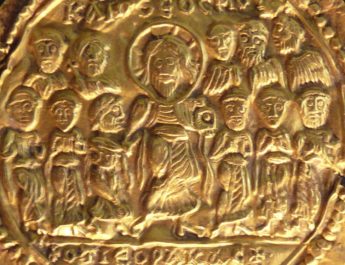Luke 6:27-38
Ordinary C13
27 “But I sayA to you that listen,B LoveC your enemies,D
A “say” = lego. This is to speak, say, name, call, command. It is generally to convey verbally.
B “listen” = akouo. This is hear or listen, but it also means to understand by hearing. This is where the word “acoustics” comes from.
C “love” = agapao. Perhaps from agan (much). This is love, longing for, taking pleasure in. It is divine love or human love that echoes divine love.
D “enemies” = echthros. From echthos (hatred). This is an openly hostile person so an enemy, a foe, or a hated person. This speaks of irreconcilable hostility. It can also mean adversary and/or refer to Satan.
doE goodF to those who hateG you,
E “do” = poieo. This is to make, do, act, construct, abide, or cause.
F “good” = kalos. From kalos (good, noble, beautiful, correct, or worthy; external signs of goodness like beauty, demonstrations of honorable character, showing moral virtues; a different word, agathos, speaks of intrinsic good). This is nobly, rightly, well-perceived, seen as appealing, morally pleasing, honorably.
G “hate” = miseo. From misos (hatred). This word is used in two ways in the New Testament. One has to do with how we prioritize. In order to prioritize something the highest, it means we have to rank other things lower. We cannot have 10 number one priorities. So, the nine that are not number 1, we love less or we value them lower. We make a moral choice the springs from our values about where we put our time, efforts, energy, etc. The other way is detesting or hatred as we normally think of it. This sense has a particular affinity with persecuting the one we hate.
28 blessH those who curseI you, prayJ for those who abuseK you.
H “bless” = eulogeo. Related to “say” in v27. From eu (good, well, well done, rightly) + logos (word, statement, speech, analogy; a word that carries an idea or expresses a thought, a saying; a person with a message or reasoning laid out in words; by implication, a topic, line of reasoning, or a motive; can be used for a divine utterance or as Word – Christ); {from lego (see note A above)}. Properly, this is speaking well of – speaking so that the other is benefited. It can mean praise, bless, thank, or call for a blessing. This is where “eulogy” comes from.
I “curse” = kataraomai. 6x in NT. From katara (curse, accursed; a curse as penalty); {from kata (down, against, throughout, among) + ara (prayer, curse, imprecation; a pray for evil); {probably from airo (raise, take up, lift, remove)}}. This is to curse, execrate, doom.
J “pray” = proseuchomai. From pros (advantageous for, at, toward) + euchomai (to wish, make a request, pray). This is to pray or pray for, to worship or supplicate. It is more literally exchanging one’s own wishes for God’s.
K “abuse” = epereazo. 2x in NT. From epereia (spiteful abuse) OR from epi (on, upon, what is fitting) + areia (threats). This is to insult, mistreat, or slander. It includes making threats or smearing another’s reputation. It is reviling that is tailored to someone in particular.
29 If anyone strikesL you on the cheek,M offerN the otherO also;
L “strikes” = tupto. 14x in NT. This is to strike, beat, or wound – generally with a stick or cudgel. It is hitting with repeated blows. So, it contrasts with paiso and patasso, which describe single blows by hand or weapon. Also contrast plesso (beating with a fist or hammer), rhapizo (to slap), and tugchaono (hitting accidentally). This word is hitting to punish. Figuratively, it can refer to being offended.
M “cheek” = siagon. 2x in NT. This is cheek, jaw, side of the face, or jawbone.
N “offer” = parecho. 16x in NT. From para (beside, by, in the presence of) + echo (to have, hold, possess). This is present, to show, bring, give, offer to hold near.
O “other” = allos. This is other, another. Specifically, it is another of a similar kind or type. There is a different word in Greek that speaks of another as a different kind (heteros).
and from anyone who takes awayP your coatQ do not withholdR even your shirt.S
P “takes away” = airo. Related to “curse” in v28. See note I above.
Q “coat” = himation. From heima (garment) OR from ennumi (to put on). This is the outer garment, cloak, robe, or mantle. It is worn loosely over a tunic.
R “withhold” = koluo. Perhaps from the same as kolazo (to punish, particularly to punish slaves so that they are restricted or chastised); from kolos (docked, dwarf). This is to hinder or prevent, restrain, refuse. It can be prevent, whether through words or actions.
S “shirt” = chiton. 11x in NT. From a Semitic language – see Hebrew kethoneth (tunic). Root means to cover. This is the garment worn beneath the cloak or robe – the one that is closest to the skin.
30 GiveT to everyoneU who begsV from you; and if anyone takes away your goods, do not ask for them again.W 31 Do to othersX as you would haveY them do to you.
T “give” = didomi. To give, offer, place, bestow, deliver. This is give in a literal or figurative sense.
U “everyone” = pas. This is all or every.
V “begs” = aiteo. This is to ask, demand, beg, desire.
W “ask…again” = apaiteo. Related to “begs” in v30. 2x in NT. From apo (from, away from) + aiteo (see note V above). This is to ask back, require, request what is due.
X “others” = anthropos. Probably from aner (man, male, husband) + ops (eye, face); {from optanomai (to appear, be seen); perhaps from horao (become, seem, appear)}. This is human, humankind. Used for all genders.
Y “would have” = thelo. This is to wish, desire, will, or intend. It is to choose or prefer in a literal or figurative sense. It can also mean inclined toward or take delight in. It can have a sense of being ready to act on the impulse in question.
32 “If you love those who love you, what creditZ is that to you? For even sinnersAA love those who love them. 33 If you do goodBB to those who do good to you, what credit is that to you? For even sinners do the same.
Z “credit” = charis. From chairo (to rejoice, be glad; used to say hello; properly, delighting in the grace of God or experiencing God’s favor); from char– (to extend favor, lean towards, be inclined to be favorable towards). This is grace, kindness, favor, gratitude, thanks. It is the sense of being inclined to or favorable towards – leaning towards someone to share some good or benefit. This can be literal, figurative, or spiritual. It is grace as abstract concept, manner, or action.
AA “sinners” = hamartolos. From hamartano (to miss the mark, do wrong, make a mistake, sin); {from a (not) + meros (a part or share)}. This is sinning, sinful, sinner. It referred to missing the mark or falling short. The term was also used in archery for missing the target.
BB “do good” = agathopoieo. Related to “do” in v27. 10x in NT. From agathopoios (a do-gooder or virtuous person; someone who does intrinsically good things); {from agathos (good, a benefit, or a good thing; good by its very nature, inherently good) + poieo (see note E above)}. This is to do good or to do right.
34 If you lendCC to those from whom you hopeDD to receive,EE what credit is that to you? Even sinners lend to sinners, to receiveFF as muchGG again.
CC “lend” = danizo. Perhaps related to “give” in v30. 4x in NT. From danos (loan, gift) OR daneion (loan, debt); {probably related to didomi (see note T above)}. This is to lend or borrow – it implies interest.
DD “hope” = elpizo. From elpis (expectation, hope, trust, confidence, faith; expectation whether abstract or concrete); from elpo (to anticipate, welcome, expect; usually to anticipate positively); from elpomai (to anticipate, expect). This is to expect, trust, hope for, or to wait in an active way.
EE “receive” = lambano. It does not refer to passive receiving of something, but active acceptance or taking of something whether it is offered or simply nearby. It focuses on individual decision and action.
FF “receive” =- apolambano. Related to “receive” in v34. 10x in NT. From apo (from, away from) + lambano (see note EE above). This is to receive back, separate, to get one’s due.
GG “as much” = isos. 8x in NT. Perhaps from eido (to know, remember, perceive – to see and so understand). This is equal, same, like, similar number or substance.
35 But love your enemies, do good, and lend, expecting nothing in return.HH Your rewardII will be great,JJ and you will be childrenKK of the Most High;LL
HH “expecting…in return” = apelpizo. Related to “hope” in v34. 1x in NT. From apo (from, away from) + elpizo (see note DD above). This is to despair of, hope to acquire, expect.
II “reward” = misthos. This is wages, pay, or salary. It can also be reward, recompense, or punishment. It is pay for services rendered in a literal or figurative way, either good or bad.
JJ “great” = polus. This is much, often, plenteous – a large number or a great extent.
KK “children” = huios. This is son, descendant – a son whether natural born or adopted. It can be used figuratively for other forms of kinship.
LL “Most High” = Hupistos. 13x in NT. From hupsos (height, high position, heaven, dignity, eminence; elevation, altitude; to be exalted); from hupsi (on high, aloft); from huper (over, above, beyond) This is highest, heights, heaven. It can also refer to God as Most High or the Supreme One.
for he is kindMM to the ungratefulNN and the wicked.OO
MM “kind” = chrestos. 7x in NT. From chraomai (to use, make use of, give what is needed, act in a specific way, request). This is useful, good, well-fitted, benevolent, kind, gracious. It was also a name given to slaves in the ancient world.
NN “ungrateful” = acharistos. Related to “credit” in v32. 2x in NT. From a (not, without) + charizomai (to show favor, kindness, or grace, to pardon, forgive); from charis (see note Z above). This is without grace, ungrateful, unpleasing.
OO “wicked” = poneros. From poneo (to toil); related to ponos (pain, trouble, labor, distress, suffering; toil, which implies anguish); from the base of penes (a laborer, poor person, starving or indigent person; someone who works for their living); from pernomai (working for a living; laborer, poor person; to work for daily bread); from peno (to toil to survive day by day). This is bad, evil, wicked, malicious, grievous, or toilsome. Properly, it is something that bears pain – it emphasizes the miseries and pains that come with evil. By contrast, the Greek kakos refers to evil as part of someone’s core character. Also contrasting the Greek sapros, which deals with falling away from a previously embodied virtue. This word can mean ill, diseased, morally culpable, derelict, vicious, malicious, or guilt. It can also refer to the devil or sinners.
36 BePP merciful,QQ just as your FatherRR is merciful.
PP “be” = ginomai. This is to come into being, to happen, become, be born. It can be to emerge from one state or condition to another or is coming into being with the sense of movement or growth.
QQ “merciful” = oiktirmon. 3x in NT. From oiktiro (to have compassion, sympathy, or pity); from oiktos (pity). This is merciful or compassionate. It can also refer to lamentation.
RR “Father” = Pater. This is father in a literal or figurative sense. Could be elder, senior, ancestor, originator, or patriarch.
37 “Do not judge,SS and you will not be judged; do not condemn,TT and you will not be condemned. Forgive,UU and you will be forgiven;
SS “judge” = krino. To judge, decide, think good, condemn, determine, pass judgment, stand trial, sue. This is judging whether it is done in court or in a private setting. Properly, it refers to mentally separating or distinguishing an issue – to come to a choice or decision, to judge positively or negatively in seeking what is right or wrong, who is innocent or guilty. It can imply trying, condemning, punishing, or avenging.
TT “condemn” = katadikazo. 6x in NT. From kata (down, against, according to, among) + dike (the principle of justice; that which is right in a way that is very clear; a decision or the execution of that decision; originally, this word was for custom or usage; evolved to include the process of law, judicial hearing, execution of sentence, penalty, and even vengeance; more commonly, it refers to what is right); may be from deiknumi (to show, point out, exhibit; figurative for teach, demonstrate, make known)}. This is to condemn, to judge as in giving a sentence. It is judgment in a particular, personal instance – to find guilty.
UU “forgive” = apoluo. From apo (from, away from) + luo (to loose, release, untie; figuratively, to break, destroy, or annul; releasing what had been withheld). This is letting go, setting free, or releasing. So, it can be to discharge, dismiss, divorce, pardon, or set at liberty.
38 give, and it will be given to you. A goodVV measure,WW pressed down,XX shaken together,YY
VV “good” = kalos. Related to “good” in v27. See note F above.
WW “measure” = metron. 14x in NT. This is a measure, whether of distance or volume. It can be a tool for measuring or the measure itself. Figuratively, it is that which determines what is sufficient. This is where the words “meter” and “metric” come from.
XX “pressed down” = piezo. 1x in NT. Perhaps from piazo (to take, catch, squeeze, capture from hunting, or arrest); {from piezo (to press down or together, to pack) OR related to biazo (to force, use power to seize); {from bia (strength, force, violence) or bios (life, livelihood, goods, wealth)}}. This is to pack or press down.
YY “shaken together” = saleuo. 15x in NT. From salos (tossing, agitation, rolling – like the sea swells). This is to agitate or shake up. It can mean to disturb, topple, incite, or destroy.
running over,ZZ will be putAAA into your lap;BBB for the measure you giveCCC will be the measure you get back.”DDD
ZZ “running over” = huperekchunno. 1x in NT. From huper (over, above, beyond) + ekchunno (to pour out, gush, spill, bestow); {from the same as ekcheo (something poured out in a liberal fashion; gushing, spilling, or shedding); {from ek (from, from out of) + cheo (to pour)}}. This is to pour out or overflow.
AAA “put” = didomi. Same as “give” in v30. See note T above.
BBB “lap” = kolpos. 6x in NT. It is bosom (as in the bosom of Abraham from Luke 16:22-23). It is also chest, where their garments would fold over. Reclining in this position connoted intimacy and union.
CCC “give” = metreo. Related to “measure” in v38. 11x in NT. From metron (see note WW above). This is to measure or estimate.
DDD “measure…get back” = antimetreo. Related to “measure” and “give” in v38. 1x in NT. From anti (opposite, instead of, against) + metreo (see note CCC above). This is to measure again, measure out by a standard.
Image credit: “Pipedreamer” by new 1lluminati, 2013.




